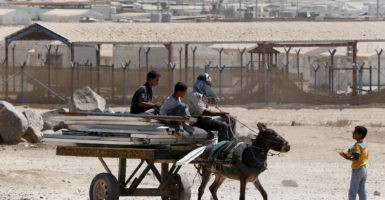U.S. tax dollars are going to relief agencies in Syria that are engaging in “bid-rigging and multiple bribery and kickback schemes” and the federal government has taken inadequate steps to prevent it, according to a recent audit.
The fraud makes an already difficult task even tougher in getting needed aid to Syrians in a country besieged by civil war and attacks by the Islamic State, according to a Government Accountability Office report, released last week.
House Middle East subcommittee Chairman Ileana Ros-Lehtinen, R-Fla., expressed concern about how the U.S. is spending during a hearing on the matter last week.
“We’re now in the sixth year of the Syrian conflict, which has brought the deaths of hundreds of thousands, caused millions to flee, and has caused millions more to be in dire need of humanitarian assistance. In response to this crisis, the United States has been the single largest contributor of humanitarian assistance, providing over $5 billion,” she said. “With no end in sight to the Syrian conflict, it is absolutely vital that we ensure that the taxpayer dollars that are used in support of these efforts are being used efficiently and effectively.”
The lack of oversight by the State Department and the U.S. Agency for International Development, better known as USAID, is worse than that in other war zones, the report says.
“USAID officials noted, for instance, that unlike humanitarian responses conducted in other countries, including those in conflict situations like Afghanistan or Iraq, USAID staff are unable to visit project sites in Syria and speak with program beneficiaries,” the GAO report said. “USAID officials also acknowledged several gaps in their monitoring system due to remote management, such as verifying progress, obtaining comprehensive monitoring data on individual activities, and assessing the quality of monitoring data reported to USAID.”
Since February 2015, there have been 116 complaints about alleged abuse of USAID funds in Syria. The most common fraud against USAID involves collusion between vendors and implementers’ procurement, involving bribes or kickbacks in exchange for contract steering, USAID Inspector General Calvaresi Barr told the House Foreign Affairs Middle East and North Africa Subcommittee.
“The Office of Inspector General’s investigations prompted USAID action that has resulted in more than $11.5 million in savings, six program suspensions, the removal of 10 employees of USAID implementers, and suspension or debarment actions against 15 individuals or companies involved in collusive bidding schemes,” Barr told the panel on July 14.
One investigation found a Turkish vendor paid by USAID delivered food ration kits with salt substituted for lentils. If the contract had not been canceled and the fraud had not been identified, the financial loss would have surpassed $106,000 for taxpayers, according to the inspector general. Further, the non-food item kits in the Syrian warehouse were missing items or included substandard products that included tarps too small to shelter even one person and poor quality frying pans.
Another investigation found that a USAID-funded Jordan contractor operated under “fabricated documentation” to claim it distributed aid to people in southern Syria. The internal watchdog’s discovery saved the taxpayers $10.5 million, according to the inspector general testimony.
Earlier this year, the inspector general reported the identification of bid-rigging and multiple bribery and kickback schemes related to contracts to deliver humanitarian aid to Syria.
Even amid all the other severe problems in Syria, fraud presents a considerable reason for concern, said Jim Phillips, senior research fellow for Middle Eastern affairs at The Heritage Foundation.
“We should be very concerned as taxpayers that more money is disappearing down a Middle East rathole,” Phillips told The Daily Signal in a phone interview. “Many USAID programs have a problem, especially in the Middle East where bureaucrats who run the program don’t have access to monitor how the money is spent.”
He isn’t surprised that Syria poses a bigger monitoring problem than Iraq and Afghanistan.
“Iraq and Afghanistan had much more security on the ground than Syria has today,” Phillips said. “There is no effective presences in Syria to protect aid workers and monitor aid workers.”
The agency has “zero tolerance” and will “take every measure at our disposal to recover misspent funds,” USAID spokesman Ben Edwards said.
“The USAID Office of Inspector General reported that, of the approximately $1.1 billion provided for the Syrian humanitarian response over the last two years, approximately one-tenth of one percent has been lost or diverted,” Edwards told The Daily Signal in an email.
“USAID has learned from this experience and is taking additional measures to protect our assistance, including limiting the amount of relief supplies in any one warehouse, enhancing program monitoring, and ensuring that programs are immediately suspended or terminated in the event of fraud or diversion,” he continued.
The State Department referred The Daily Signal to USAID.
In the second half of 2015, there were 47 complaints of waste, fraud, and abuse related to aid dollars in Syria and Iraq made to the USAID Office of Inspector General. The inspector general still has four ongoing investigations of allegations of fraud and mismanagement. According to the GAO report:
Two of those investigations involve allegations of procurement fraud, bribery, and product substitution in USAID funded humanitarian cross-border programs related to procurements of non-food items.
Mismanagement has occurred because of a lack of action from the State Department and USAID, according to the GAO report.
“State and USAID do not require implementing partners to conduct comprehensive risk assessments for humanitarian assistance delivered to people inside Syria, and while most partners assessed safety and security risks associated with such programs, most did not assess financial risks, such as the risk of fraud,” the report says.




























